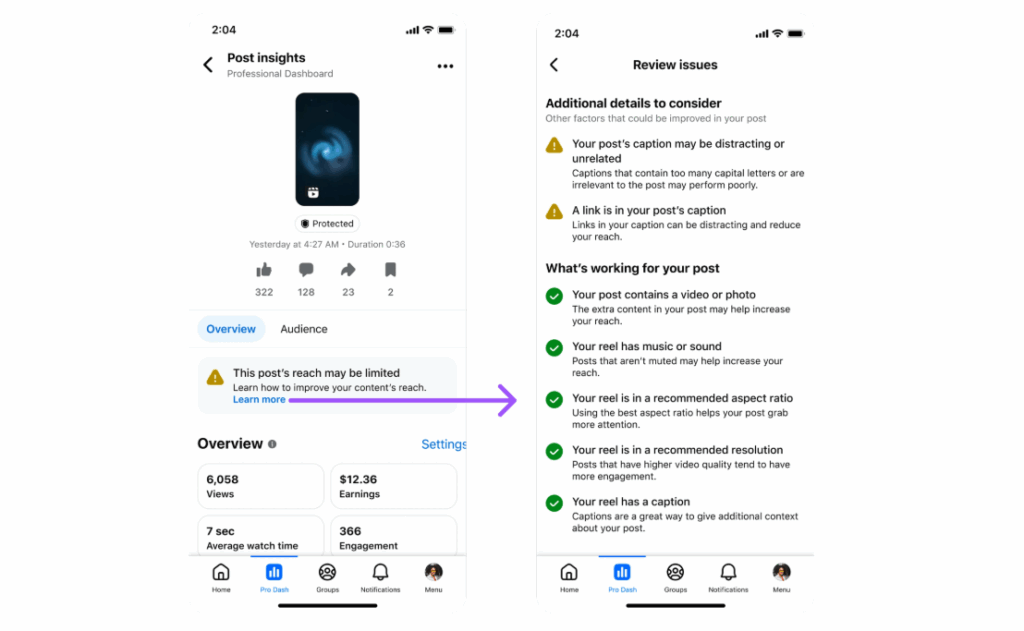Facebook is rolling out a major algorithm change aimed at elevating original content and penalising serial reposters. The update reflects a growing platform-wide effort by Meta to protect creators and ensure that those producing fresh, authentic work receive the visibility, engagement and monetisation opportunities they deserve.
The shift marks one of Facebook’s most direct moves yet to clean up its content ecosystem and prioritise quality over quantity, particularly as content theft, impersonation and AI-driven duplication continue to rise.
Demoting Unoriginal Content Across the Platform
At the heart of the update is a clampdown on what Facebook defines as unoriginal content. That includes posts, video, photo or text, that are repeatedly reused or repurposed without crediting the original creator or adding any meaningful enhancements.
Facebook distinguishes between true remixing and blatant duplication. Reaction videos, commentary, and creative remixes are still welcome. What the platform is targeting is the copy-paste approach: frame-for-frame reposts and word-for-word duplicates that offer no new value.
Accounts that frequently share such content will now face two major consequences:
-
Reduced distribution for all content posted by the account, not just the reposted items.
-
Temporary removal from Facebook’s monetisation programmes, directly impacting ad revenue and brand partnership potential.
This move aims to break the cycle in which aggregators benefit from work they didn’t create, often reaching large audiences and generating revenue while the original creators are left behind.
Supporting Attribution and Original Reach
In addition to these penalties, Facebook is developing features to support better attribution. One new option in testing involves adding a link to duplicated videos, directing viewers to the original post. This could become an important tool in restoring visibility to creators whose content is widely reused without consent.
According to Facebook, the algorithm will also actively demote duplicate versions of a video when the original is detected. The goal is to ensure that the true creator appears in Feeds and recommendations, rather than those recycling the content.
These updates will roll out gradually over the coming months, allowing creators and publishers time to adjust and assess their current practices.
A Broader Push Against Spam and Fake Engagement
Facebook’s content clean-up is part of a broader initiative to improve Feed relevance and surface quality content. In the first half of 2025 alone, the platform took action against over 500,000 accounts for spammy behaviour or fake engagement, and removed around 10 million impersonator profiles. These accounts often pose as creators or reshare content without permission, eroding trust and damaging the user experience.
Now, Facebook is going further by cracking down on repetitive reposting. Accounts that repeatedly publish unoriginal content could find themselves locked out of monetisation and hidden from discovery tools such as recommendations and Explore feeds.
This mirrors similar efforts by Instagram last year. In 2024, Instagram began removing reposted content from recommendations and directly replacing those posts with the original version where possible. Aggregator accounts reposting more than ten unoriginal pieces in 30 days saw their content excluded from discovery. While Instagram’s changes were focused on surface-level recommendations, Facebook’s approach goes deeper, extending across distribution and monetisation systems.
Best Practices for Creators and Marketers
To help users navigate the changes, Facebook has issued a set of best practices designed to maximise reach and maintain eligibility for monetisation:
-
Prioritise original content: Posts filmed or created by the user receive the highest distribution.
-
Make meaningful enhancements: Adding commentary, editing with intent, or incorporating storytelling elements qualifies. Watermarks, filters or basic stitching do not.
-
Avoid reposting content with watermarks: Material visibly recycled from other platforms may be penalised.
-
Use relevant captions and hashtags: Keep language clear, concise and specific to the content. Limit hashtags to five or fewer.
-
Maintain content quality: Short videos with little value may underperform. Authentic storytelling tends to resonate more with users and the algorithm.
The platform has also updated the Professional Dashboard to offer post-level insights that reveal whether content has triggered distribution or monetisation penalties. Additionally, a new Support Home screen allows creators to check if they are at risk of losing access to key features.
Why It Matters
For marketers, creators and agencies, these changes are significant. Facebook is not simply deprioritising bad behaviour. It is actively rewarding originality. The message is clear: quality, authentic content is no longer just a brand differentiator, it is an algorithmic advantage.
Teams relying on reposting strategies, aggregation tactics or minimal-content pipelines may need to reassess quickly. For influencers and content creators, the update is a chance to stand out, especially as platforms work to surface fresh perspectives and smaller voices over large-scale content mills.
Meta’s evolving position on content authenticity reflects a broader industry trend, as platforms like YouTube, TikTok and Instagram implement similar measures. AI-generated clones, mass-produced memes and duplicate formats are increasingly seen as threats to creator ecosystems, not assets.
Facebook’s latest update puts creators back at the centre of the platform. Those investing in original storytelling and meaningful engagement will see the benefits in reach, visibility and revenue. For those leaning on reposts, the time to pivot is now.




RECOMMENDED FOR YOU
Meta Taps Publishers to Power AI Outputs
Meta has re-entered the news licensing space with a…
Meta has re-entered the news licensing space with a…
Meta Launches AI Support Hub on Facebook and Instagram
Managing account issues on Facebook and Instagram has long…
Managing account issues on Facebook and Instagram has long…
Meta Adds New AI Tools To Supercharge Lead Gen
Meta is rolling out a wave of updates to…
Meta is rolling out a wave of updates to…